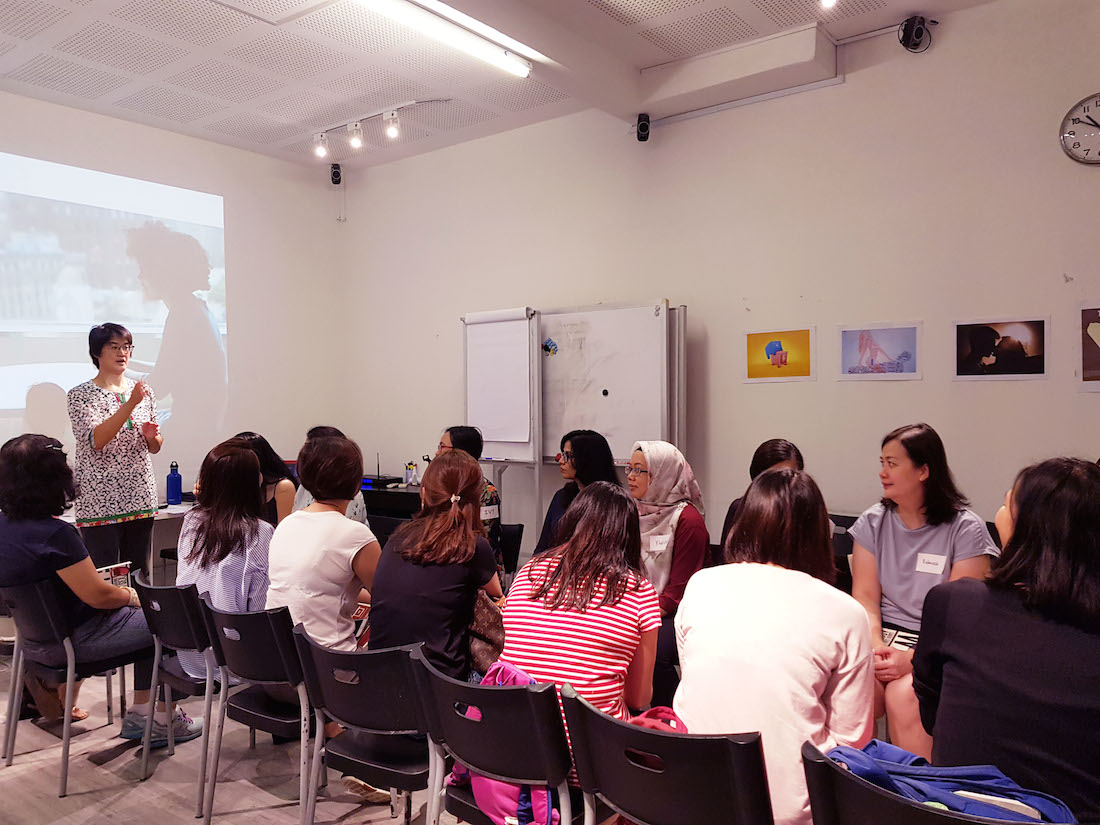-
Advocacy Theme
-
Tags
- Abortion
- Adoption
- Caregiving
- CEDAW
- Disability
- Domestic Violence
- Domestic Workers
- Harassment
- Healthcare
- Housing
- International/Regional Work
- Maintenance
- Media
- Migrant Spouses
- Migrant Workers
- Muslim Law
- National budget
- Parental Leave
- Parenthood
- Polygamy
- Population
- Race and religion
- Sexual Violence
- Sexuality Education
- Single Parents
- Social Support
- Sterilisation
- Women's Charter
A Recap: Birds & Bees January Workshop for Parents
January 29th, 2019 | Children and Young People, Family and Divorce, News, Sexual and Reproductive Health
 Written by Rachel Lee, AWARE intern
Written by Rachel Lee, AWARE intern
Don’t be salty if you missed this workshop, parents.
“Salty”? Yeah, it means “upset” in slang these days.
A pop quiz consisting of slang used by today’s teens was a highlight of the experiential workshop Birds & Bees, held at AWARE Centre on the morning of Saturday, 19 January 2019. For most of the 14 participants, the terms covered were eye-opening: “Netflix and chill”, for example, caught people off guard with its less-than-innocuous figurative meaning.
Birds & Bees is a new AWARE workshop series to help parents sustain important conversations about sex with their children in a non-judgmental way. Over the course of three hours, parents use case-studies, role-play and facilitated discussions to reflect on their values and sexual health knowledge, and improve communication with their children.
So how do we start a conversation about sex with our children? Do we just sit them down and launch into “the talk”?
Birds & Bees trainer Tan Joo Hymn emphasises that listening is just as important as speaking in these situations. After all, in AWARE’s 2018 survey on youth perceptions, 70 percent of youths who responded did not know if their parents were interested in their thoughts on sexual matters, or believed their parents to be rarely interested in the subject—a notion that, judging by interest in this workshop, is not true.
Joo Hymn also stressed that going in without preconceived notions was essential: “It is important to listen with an open mind, because what’s the point of listening if you have already made up your mind?”
To demonstrate these tenets, workshop participants paired up and took turns playing a listener and a speaker. Their takeaways drove home the point: If someone was listening with their full attention, it made the speaker want to share more; the listener could also feel the emotions behind his or her partner’s words. Conversely, not listening with full attention made the speaker frustrated and unwilling to share more. If parents find it hard to have a conversation with their children, therefore, they may need to reflect on their own behaviour and unconscious signals.
Another tip from Joo Hymn: Parents can try to create opportunities that naturally lead to having these conversations. A suggestion by Joo Hymn was for parents to leave relevant educational materials around the house, which may spark curiosity in children and start the conversation going.
The workshop ended off with case study discussions, during which an extremely important point was raised: “A lot [of attention is placed] on keeping our daughters safe, but more should be on teaching our children not to harass people,” said Joo Hymn. In other words, by having these important conversations early, parents can not just teach their children safety, but teach their children to behave with respect and compassion, too.
Chye Shu Wen, a 28-year-old participant of the workshop, said afterwards, “It was refreshing and nice to see parents with children of different ages at the workshop, as it takes initiative for parents to come.” Shu Wen herself is not a parent, but has young siblings on the cusp of puberty, and wants to apply the lessons learned at Birds & Bees to them.
Ultimately, taking an interest in workshop like this one is the first step to good parental communication.



